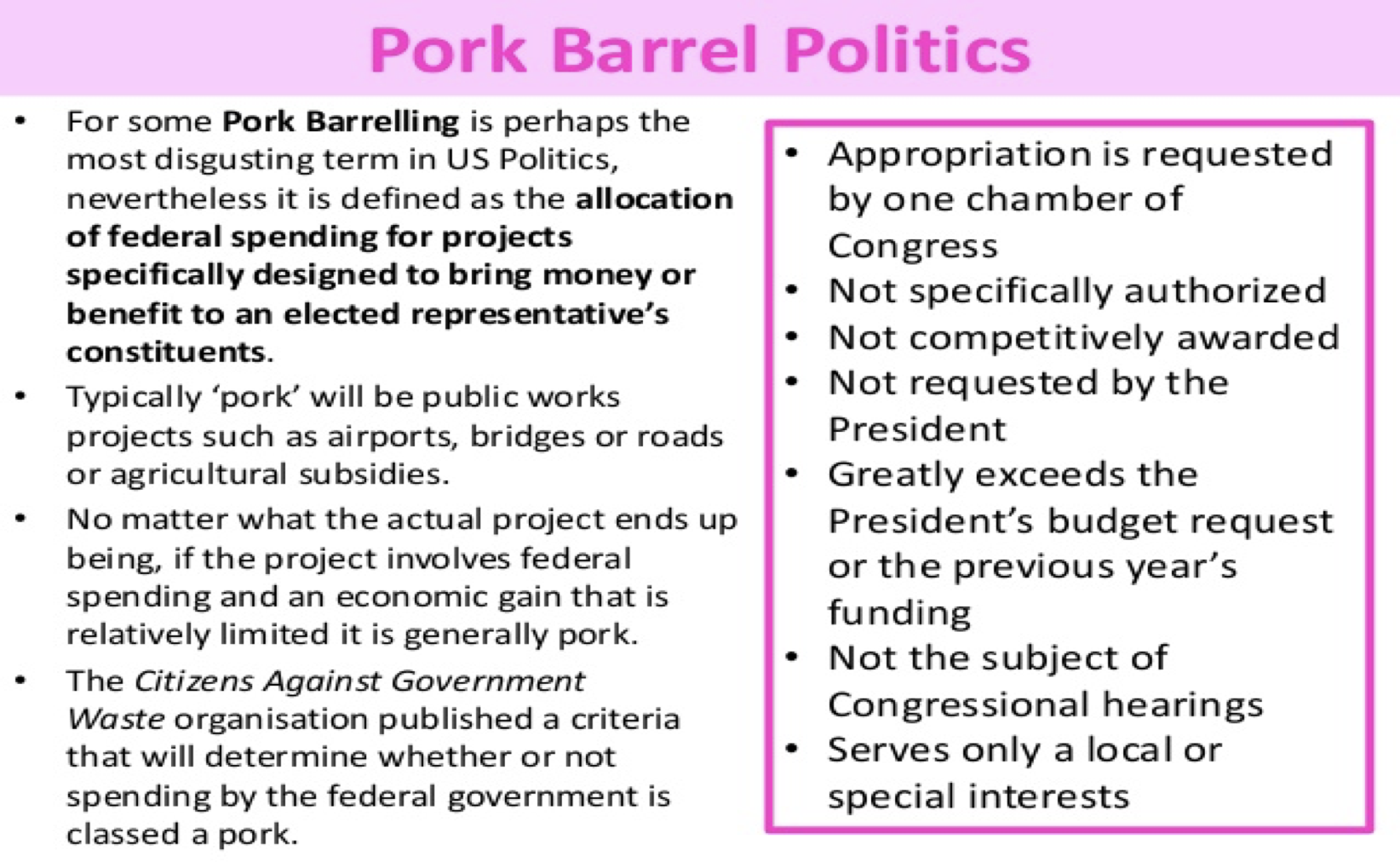congress
status
senate seen as more prestigious
6 year terms
senators go on to be presidential candidates
house members often aspire to be senators
house elected every 2 years
however, house speaker very important - when diff party to president they become effectively leader of the opposition. nancy perosi was hugely influential, Kevin McCarthy much less so
senators are generalists - more concerned w national + international affairs
represent broader range of opinion traditionally (though less republican moderates now following midterms)
Traditionally more collegiate – though partisanship has increased dramatically more recently. Less committee based.
Representatives are specialists – they stand on specialist committees
Fewer constituents so a closer relationship with them – they also need to be more responsive to them
Bigger, so needs more organisation and bureaucracy
representation
There is voting every two years for some part of Congress
Congressional elections use the FPTP system
Members of both chambers are elected in single-member constituencies, whole states for the Senate, districts for the House
Congressional elections are also subject to primaries, much like presidential elections, if a party has one or more candidate wanting to represent the area
incumbency
Several factors help the incumbent in an election:
Use of office – they can attract donors and establish popularity
Safe seats and gerrymandering – the drawing of electoral boundaries to favour a certain social group or party
Pork-barrel legislation – when a member of Congress proposes an amendment to legislation that brings benefits to a particular group (a kind of group bribe)
operation REDMAP
after obama’s 2008 victory, republican tacticians drew up a cunning plan:
target democrat states due to redraw house-district boundaries
in pennsylvania, republicans campaigned to target small number of democrats. republicans won majority. they then decided the boundaries
new maps meant democrats won far less. 2012, democrat congressional candidates won 100,000 more votes but republicans won 13 of the 18 seats, 51% of the democrat vote ended up getting just 28% of the seats
pork-barrelling
effectively offering sweeteners to an area prior to an election
often financial – infrastructure or service provision. dubbed ‘an earmark’
2010 republicans placed a moratorium on earmarks but still happens
2016 – representatives byrne and ribble supported spending $475 million on new navy ship that navy didn’t want but their districts represented shipbuilding companies

examples:
Example 1: The Big Dig (Boston, Massachusetts)
Project Objective: Relocate a 3.5-mile (5.6 km) interstate highway underground.
Final Cost: USD $14.6 billion (over $4 billion per mile).
Political Involvement:
Advocated by Tip O'Neill (Democrat, Massachusetts), Speaker of the U.S. House of Representatives.
Federal government funding was secured for the project under his leadership.
Criticism: Widely regarded as a classic example of pork-barrel spending due to its high costs and perceived inefficiency.
Example 2: Gravina Island Bridge ("Bridge to Nowhere") - Alaska
Project Objective: Construct a bridge to connect:
Gravina Island's 50 residents.
Ketchikan International Airport to Revillagigedo Island and Ketchikan.
Projected Cost: USD $398 million.
Political Involvement:
Supported by Republican Senator Ted Stevens during the 2008 U.S. presidential campaign.
Criticism: Used as a prime example of wasteful government spending (pork-barrel spending).
financial advantage
incumbents can attract more money
challengers struggle to gain name recognition
2016 elections: incumbents raised 41.5 million per candidate as opposed to $0.21 million for challengers
supreme court struck down attempts to limit terms of congressmen/women and senators
voting behaviour in congress
number of factors influence or pressurise Congressional politician
public opinion
party
caucuses (group of senators/representatives that have something else that binds them together)
interest groups
public opinion
more accountable to public than president. elections every 2 years for house
public often vote for individual policies of candidate (less so in midterms) as much as party line
opposition to obamacare in 2009 by their constituencies meant several democrats changed their position. also several republicans who won former democrat seats opposed repealing obamacare in 2017
many republicans (ron desantis, jd vance, etc.) have maintained a more right wing stance since 2020 hoping to ride trump’s coattails.
party
pressure to vote with party
some patronage for compliance
team competition – us versus them
partisanship and now – hyper-partisanship!
caucasus
definition: “groups of legislators who share special interests and meet to pursue common legislative objectives, such as black caucus, women’s caucus, hispanic caucus”
black caucus has 40 members
congressional steel caucus has 100 members
interest groups
can influence politicians by large donations
the AFL-CIO (american federation of labor and congress of industrial organisations) has a large, active and influential membership
can mobilise and threaten removal
NRA carries more weight than public opinion
lobbyists and big business can lead to politicians getting high paid jobs once their political career ends